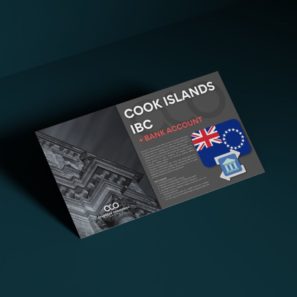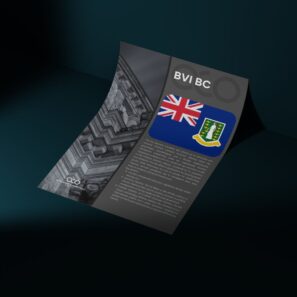Description
What’s Included?
- Registered and operational company
- Complete application process handled on your behalf
- Due diligence checks conducted as part of the service
- Drafting of country-compliant company documents such as the operating agreement
- Coverage of all third-party costs, including first-year registration fees with the appropriate government body
- Application guide outlining each step of the application process.
The Cook Islands International Business Company (IBC) is an increasingly popular option for individuals and businesses aiming to create a corporate entity in a confidential and secure offshore jurisdiction. Unlike many other jurisdictions, the Cook Islands does not list shareholders and directors on any public beneficial ownership registers, ensuring greater confidentiality.
Key Benefits:
- Flexible Management Structure: Sole shareholders and directors are permitted and directors need not be resident in the Cook Islands. A resident secretary is required which must be an officer of a licensed Cook Islands trustee company.
- Strong Anti-Creditor Legislation: Foreign judgments are not recognized in the Cook Islands, requiring creditors to bring their case before the Cook Islands High Court.
- Limited Liability: A shareholder’s liability is limited to the capital investment.
- Confidentiality and Privacy: There is no Beneficial Ownership register. The identities of managers, members, and beneficial owners are confidential, not retained in any centralized register, and cannot be divulged without reasonable excuse.
- Asset Protection: Take advantage of the Cook Islands’ robust asset protection and privacy laws, ensuring your assets are shielded from legal claims, creditors, and judgments.
- Tax Efficiency: Enjoy tax exemption on income generated outside the Cook Islands. The IBC functions as a pass-through entity, with earnings taxed according to the individual’s country of residency.
- Legal Stability: Conduct business within a stable legal and regulatory framework.
- International Recognition: Benefit from the Cook Islands’ global respect and recognition, enhancing your international business operations.
- Unique Uses: Can be used in conjunction with yacht registration in the Cook Islands.
About the Cook Islands: The Cook Islands, nestled in the South Pacific, holds strategic significance as an offshore financial center. Its geographical proximity to major regions like New Zealand and Australia makes it an appealing choice for individuals and businesses seeking to establish offshore structures. The Cook Islands is renowned for its friendly and professional government body, that continues to uphold its strength and reputation as a premier offshore financial center.
Other Requirements:
- Notification of Changes: Any changes in shareholder, director or secretary must be notified to Registrar within 30 days.
- Resident Secretary: A resident secretary is required which must be an officer of a licensed Cook Islands trustee company.
The Structure:
- Shareholder(s): Cook Islands IBCs are structured around shareholders, who can encompass individuals or corporate entities. They hold shares that signify their ownership stake in the company. Cook Islands IBCs offer flexibility, allowing for one or multiple shareholders, with their details maintained confidentially.
- Director(s): Cook Islands IBCs mandate at least one director, who can be an individual or a corporate entity. Importantly, directors are not bound to residency in the Cook Islands, granting further flexibility.
- It is common for the person establishing the IBC to appoint themselves as the sole Shareholder (100% ownership) and Director
- Share Capital: Cook Islands IBCs can establish authorized share capital, typically outlined during incorporation. This authorized share capital serves as the basis for issuing shares to shareholders, denominated in any chosen currency. The share capital structure entails key components including currency denomination, the maximum number of authorized shares, the initial issuance quantity, and the par value per share, representing its nominal or minimum value upon issuance. The required minimum share capital is $1 USD per share, which must be fully paid by the shareholder. Thus, a single shareholder must pay $1 USD to the company.
- For instance:
- Currency Denomination: USD
- No. of Authorized Shares: 50,000
- No. of Issued Shares: 1
- Par Value of Each Share: $1 USD
- For instance:
- Articles of Incorporation: The company’s structure and operations are governed by its Articles of Incorporation. These articles outline details such as the company’s name, registered office address in the Cook Islands, share capital structure, and internal management protocols.
- Registered Agent: A registered agent in the Cook Islands is required and included in your incorporation fee.
Establishing a Cook Islands IBC through OCO’s efficient onboarding process can see your IBC operational in just 2-5 days. This setup offers a reliable solution for those seeking asset protection, tax efficiency, and confidentiality within a reputable offshore jurisdiction.
View the full governing legislation here: Cook Islands Finance – Legislation
Where is the Cook Islands?
The Cook Islands is a group of 15 small islands located in the South Pacific Ocean, northeast of New Zealand. It lies approximately 3,000 kilometers (about 1,860 miles) northeast of New Zealand and 4,500 kilometers (about 2,800 miles) southwest of Hawaii. The Cook Islands is a self-governing territory in free association with New Zealand, and it enjoys a high degree of autonomy while benefiting from New Zealand’s economic and administrative support.
Why should I use Offshore Companies Online for my company formation?
Offshore Companies Online streamlines the process by managing the entire application for you, conducting due diligence checks, and preparing compliant company documents. We cover all third-party costs, including first-year registration fees, ensuring a smooth and stress-free experience. Additionally, we provide an application guide to assist you every step of the way. Our all-inclusive “pay-when-completed” model guarantees transparency and peace of mind.
Do I need to visit the Cook Islands to open my LLC?
No, you do not need to visit the Cook Islands to open your LLC. The entire process can be completed remotely, saving you time and travel expenses.
What if a creditor wins their claim?
If a creditor were to win their claim, the sole remedy available is a non-renewable three-year charging order over your membership interest. This means that if a distribution occurs, the creditor would be entitled to a share. However, since the charging order is non-renewable, you can refrain from making distributions for the three-year period. Additionally, the creditor must retain a Cook Islands attorney and bring the case to the Cook Islands High Court for any action to be enforced, providing significant protection for your assets.
What documents are required to set up a Cook Islands LLC?
To set up a Cook Islands LLC, you will need to provide identification documents such as a passport, proof of address, and any additional information required for due diligence checks.
Are there any restrictions on the types of business activities a Cook Islands LLC can engage in?
A Cook Islands LLC can engage in a wide range of business activities. However, it cannot conduct business activities within the Cook Islands itself if it wishes to maintain tax-exempt status.
How does taxation work for a Cook Islands LLC?
A Cook Islands LLC is exempt from local taxes on income generated outside of the Cook Islands. It operates as a passthrough entity, with earnings taxed based on the individual residency of the members.
Can I open a bank account for my Cook Islands LLC?
Yes, you can open a bank account for your Cook Islands LLC. It is often recommended to open a bank account in conjunction with establishing the LLC for comprehensive financial management.
Is my information secure with a Cook Islands LLC?
Yes, your information is highly secure. The Cook Islands has strong confidentiality laws, and there is no public register of beneficial owners, managers, or members, ensuring your privacy.
What is the role of a registered agent for a Cook Islands LLC?
A registered agent is required for a Cook Islands LLC and acts as the company’s official point of contact within the jurisdiction. The agent handles compliance and regulatory correspondence on behalf of the LLC. This service is included in your incorporation fee.






